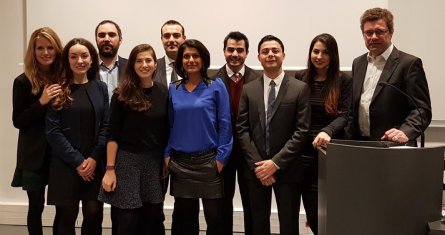Industrial Relations and Firms’ Competitiveness Chair
See this page in:
 [FR]
[FR]

It aims to develop a greater understanding of industrial relations’ challenges, be they economic, social or societal, and their impact with regard to governance and innovation…
The importance of good industrial relations as a performance and innovation lever is now well established. Industrial relations are consequently at the heart of business issues, particularly due to the current economic instability and the development of new forms of business related to digital technology.
 A few words from
A few words from
Jean-François Pilliard
President of the Chair

Jean-François Pilliard
President of the Chair
"The establishment of this Chair embodies the will to develop a culture of industrial relations for future and current leaders. Research carried out within a global framework must facilitate behavioural change and advance the content of teaching on this subject."
Jean-François PILLIARD
Affiliate Professor at ESCP Europe, former CEO of IUMM, Vice President of MEDEF and President of the "Pôle Social", Co-President of the European Metallurgy Industrial Relations.
 A few words from
A few words from
Maria Koutsovoulou
Scientific
Director

Maria Koutsovoulou
Scientific
Director
"Collective bargaining is at the heart of my research, which looks at especially at the processes of influence and decision-making at work in the organisational environment. I welcome the Industrial Relations and Firms’ Competitiveness Chair project with great enthusiasm. Due to its complexity and the many factors that influence the process, collective bargaining offers a very rich field for research. In addition, the existence of different collective bargaining practices, resulting from different cultural approaches, strengthens our desire to undertake international comparative research in the Chair that can lead to conclusions which will provide stakeholders with the opportunity to broaden their outlook and practical knowledge of this process. Finally, the common goal of this research is to identify factors both internal and external to organisations, that can make industrial relations a real asset for business performance. ESCP Europe, with its international positioning and humanist managerial approach is the natural birthplace of such a Chair."
Maria KOUTSOVOULOU
Doctor in Psychology, Associate Professor and Scientific Director of the Chair
 A few words from
A few words from
Patrice Laroche
Director of the Chair’s
Academic Committee

Patrice Laroche
Director of the Chair’s
Academic Committee
"Academic research is far from having considered all the mechanisms by which industrial relations can affect business performance. The ambition of this Chair is, in particular, to produce academic studies whose objective will be to examine more systematically the impact of such relationships on business competitiveness, taking into account the institutional frameworks within which industrial relations take place. Thus, the comparative analysis of national industrial relations systems will enable the mechanisms at work to be better understood. This international comparative approach is also fully in line with European and international management culture of ESCP Europe."
Patrice Laroche
Affiliate Professor and honorary member of the Institut Universitaire de France (IUF) will be Director of the Chair’s Academic Committee as well as all of its research activities.
Objectives
Have a real impact on company policy
The Industrial Relations and Firms’ Competitiveness Chair stems from the desire to provide a platform for exchange of knowledge and best practices, which will further knowledge and the development of innovative methods capable of having a real impact on company policy (in France, but also in Europe and worldwide).
The aim of the Industrial Relations and Firms’ Competitiveness Chair is threefold
- To create a centre of excellence for research on industrial relations and business performance.
- To bring together experts of several nationalities and a community of practitioners to reflect on the development of industrial relations in companies
- To provide a platform for exchange of best practices in industrial relations, connecting economic and social approaches.
Its activities will focus on three fields
- Creating new teachings at ESCP Europe on the theme of industrial relations as a corporate performance driver.
- Developing research on this subject, in particular by creating an international observatory of industrial relations and producing research on the theme via a network of researchers in France, Europe and worldwide.
- Organising a series of seminars bringing together practitioners, students and teacher-researchers.
Areas of research
The evolution of professional relations in the era of...
...globalisation
...individualisation
...digitisation
The meaning of the partnership
Renault
Renault wished to join ESCP Europe and three other international partners to create this Chair to explore, from a futuristic point of view, how to have a successful dialogue on an international level in a world undergoing massive societal change, being increasingly affected by political, economic and social evolution. With its international scope, Renault will share its worldwide experience and practices, notably through the activities of the World Group Committee. It may also contribute to the development of training programmes.
Airbus
Airbus is a global leader in aerospace, defence and related services with more than 138,600 employees worldwide. This company is only the success it is today because it has embraced efficient social dialog across countries to foster people engagement and the culture of change. Airbus strives to develop trustful relationship with its social partners. Maintaining positive employee relations is key to the success and sustainability of the company.
Creating this chair with ESCP Europe and 3 other successful companies is a great opportunity to investigate the link between social dialog and company’s performance as well as to share knowledge and best practices in an international environment. Airbus is committed to proactively contribute to the innovative thinking of industrial relations.
Sodexo
For Sodexo, the quality of industrial relations contributes to improving employees’ lives, and thus has a direct impact on consumer satisfaction and client performance. As the world is changing very rapidly, we must innovate to continue to make progress in this field. The research and work carried out with ESCP Europe and 3 large companies that share the same objectives, will open up new opportunities.
Solvay
Solvay supports the creation of "Industrial Relations and Firms’ Competitiveness Chair". With this partnership, the Group intends to contribute to discussions in this field on an international scale and to be enriched by a very high level of expertise.
The aim is to draw on this expertise in social dialogue to develop professional relatiobs and continue to improve in this field.
The term "social dialogue" has different meanings in different countries. For Solvay, this is a process of involving employees in the company's transformation. Solvay considers that quality social dialogue is one of the conditions of the company's economic performance.
L'équipe

Jean-François
Pilliard
President of the Chair

Marie
Koutsovoulou
Scientific Director

Patrice
Laroche
Director of the Chair’s
Academic Committee
Focus on ...

News
25 January 2018
Video
A look back at the themes of the inaugural conference of the Social Dialogue and Business Competitiveness Chair. The quality of social dialogue, a guarantee of competitiveness? November 17, 2016.
News and Events
Events
CHECK OUT OUR PLAYLIST…
Videos
Industrial Relations and Firms’ Competitiveness Chair - inaugural conference [FR]
Digitalisation & dialogue social : un enjeu majeur [FR]
Comment la chaire Dialogue social accompagne les acteurs du dialogue social sur le digital ? [FR]
Restaurer le dialogue social en France [FR]
Research & Publications
Policy Paper
What white-collar jobs moving to India means for the US and Indian legal industry
13 March 2019
This policy paper examines the case of the US law industry, which has seen more and more work being offshored to India.
Written by Sarosh Kuruvilla
Policy Paper
Industrial Relations: the importance of the negotiator’s motivation in labour talks
04 October 2018
An experimental study showed that negotiators’ motivation have a significant effect on the quality of labour talks, which have become increasingly important.
Written by Maria Koutsovoulou
Research
How Credible Is Trade Union Research? Forty Years of Evidence on the Monopoly–Voice Trade-Off?
26 feb 2018
This article is the second in a series to celebrate the 70th anniversary of the ILR Review. The series features articles that analyze the state of research and future directions for important themes this journal has featured over many years of publication.
Writed by Hristos Doucouliagos, Richard B. Freeman, Patrice Laroche, T. D. Stanley





